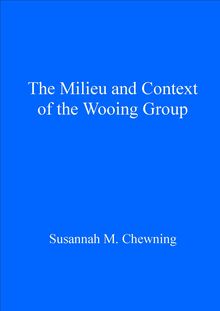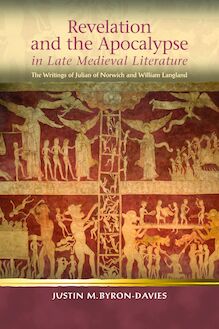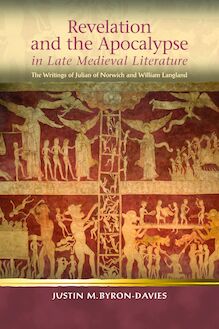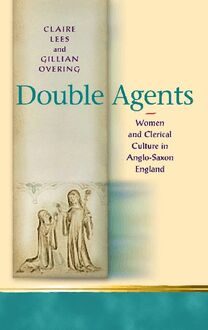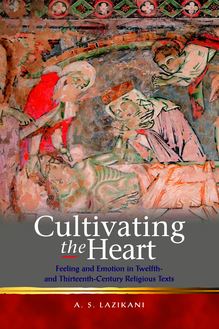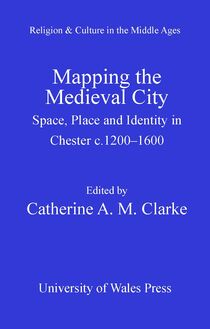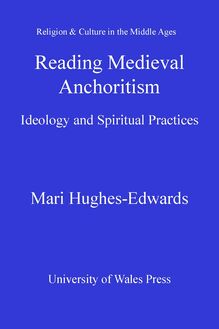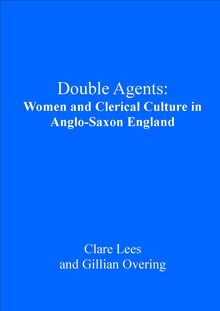-
 Univers
Univers
-
 Ebooks
Ebooks
-
 Livres audio
Livres audio
-
 Presse
Presse
-
 Podcasts
Podcasts
-
 BD
BD
-
 Documents
Documents
-
- Cours
- Révisions
- Ressources pédagogiques
- Sciences de l’éducation
- Manuels scolaires
- Langues
- Travaux de classe
- Annales de BEP
- Etudes supérieures
- Maternelle et primaire
- Fiches de lecture
- Orientation scolaire
- Méthodologie
- Corrigés de devoir
- Annales d’examens et concours
- Annales du bac
- Annales du brevet
- Rapports de stage
La lecture à portée de main
Vous pourrez modifier la taille du texte de cet ouvrage
Découvre YouScribe en t'inscrivant gratuitement
Je m'inscrisDécouvre YouScribe en t'inscrivant gratuitement
Je m'inscrisEn savoir plus
Vous pourrez modifier la taille du texte de cet ouvrage
En savoir plus

Description
Middle English devotional compilations – consisting of a series of texts or extracts of texts that have intentionally been put together to constitute new and unified devotional texts – have often been approached as complex collections of source texts that need to be linked with their originals. This book argues that the study of compilations should move beyond the disentanglement of their sources. It approaches compiling as a literary activity and an active way of shaping the medieval text, with the aim to nuance scholarly discussion about compiling by putting greater emphasis on the literary instead of the technical aspects of compiling activity. In addition to describing the additions, omissions and other types of adaptations that compilers made to their source texts, Middle English Devotional Compilations highlights the nature and function of compiling activity in late medieval England, and examines three major but understudied Middle English devotional compilations in depth: The Pore Caitif, The Tretyse of Love and A Talkyng of the Love of God.
Series Editors’ Preface
Volume Preface
Acknowledgements
List of Tables
Abbreviations
1. Compiling Styles and Strategies
2. The Pore Caitif
3. The Tretyse of Love
4. A Talkyng of the Love of God
Afterword: Without the Multiplication of Many Books?
Bibliography
Appendix: A transcription of ‘ȝe þat wollen lerne to loue god rede þis litill scripte’
Index
Sujets
Informations
| Publié par | University of Wales Press |
| Date de parution | 15 octobre 2019 |
| Nombre de lectures | 0 |
| EAN13 | 9781786834782 |
| Langue | English |
Informations légales : prix de location à la page 0,2500€. Cette information est donnée uniquement à titre indicatif conformément à la législation en vigueur.
Extrait
RELIGION AND CULTURE IN THE MIDDLE AGES
Middle English Devotional Compilations
Series Editors
Denis Renevey (Université de Lausanne)
Diane Watt (University of Surrey)
Editorial Board
Miri Rubin (Queen Mary University of London)
Jean-Claude Schmitt (École des Hautes Études en Sciences Sociales, Paris)
Fiona Somerset (Duke University)
Christiania Whitehead (University of Warwick)
RELIGION AND CULTURE IN THE MIDDLE AGES
Middle English Devotional Compilations
COMPOSING IMAGINATIVE VARIATIONS IN LATE MEDIEVAL ENGLAND
DIANA DENISSEN
© Diana Denissen, 2019
All rights reserved. No part of this book may be reproduced in any material form (including photocopying or storing it in any medium by electronic means and whether or not transiently or incidentally to some other use of this publication) without the written permission of the copyright owner except in accordance with the provisions of the Copyright, Designs and Patents Act. Applications for the copyright owner’s written permission to reproduce any part of this publication should be addressed to University of Wales Press, University Registry, King Edward VII Avenue, Cardiff CF10 3NS.
www.uwp.co.uk
British Library Cataloguing-in-Publication Data
A catalogue record for this book is available from the British Library.
ISBN 978-1-78683-476-8
e-ISBN 978-1-78683-478-2
The right of Diana Denissen to be identified as author of this work has been asserted in accordance with sections 77 and 79 of the Copyright, Designs and Patents Act 1988.
The publisher has no responsibility for the persistence or accuracy of URLs for any external or third-party internet websites referred to in this book, and does not guarantee that any content on such websites is, or will remain, accurate or appropriate.
Cover image: Add. MS 22283 (folio 172v), fragment of A Talkyng of the Love of God (IPMEP 749) © The British Library Board (Add. 22283, f.172v).
Cover design: Olwen Fowler
C ONTENTS
Series Editors’ Preface
Volume Preface
Acknowledgements
List of Tables
Abbreviations
1 Compiling Styles and Strategies
2 The Pore Caitif
3 The Tretyse of Love
4 A Talkyng of the Love of God
5 Afterword: Without the Multiplication of Many Books?
Bibliography
Appendix: A transcription of ‘ȝe þat wollen lerne to loue god rede þis litill scripte’
Notes
S ERIES E DITORS ’ P REFACE
Religion and Culture in the Middle Ages aims to explore the interface between medieval religion and culture, with as broad an understanding of those terms as possible. It puts to the forefront studies which engage with works that significantly contributed to the shaping of medieval culture. However, it also gives attention to studies dealing with works that reflect and highlight aspects of medieval culture that have been neglected in the past by scholars of the medieval disciplines. For example, devotional works and the practice they infer illuminate our understanding of the medieval subject and its culture in remarkable ways, while studies of the material space designed and inhabited by medieval subjects yield new evidence on the period and the people who shaped it and lived in it. In the larger field of religion and culture, we also want to explore further the roles played by women as authors, readers and owners of books, thereby defining them more precisely as actors in the cultural field. The series as a whole investigates the European Middle Ages, from c .500 to c .1500. Our aim is to explore medieval religion and culture with the tools belonging to such disciplines as, among others, art history, philosophy, theology, history, musicology, the history of medicine, and literature. In particular, we would like to promote interdisciplinary studies, as we believe strongly that our modern understanding of the term applies fascinatingly well to a cultural period marked by a less tight confinement and categorization of its disciplines than the modern period. However, our only criterion is academic excellence, with the belief that the use of a large diversity of critical tools and theoretical approaches enables a deeper understanding of medieval culture. We want the series to reflect this diversity, as we believe that, as a collection of outstanding contributions, it offers a more subtle representation of a period that is marked by paradoxes and contradictions and which necessarily reflects diversity and difference, however difficult it may sometimes have proved for medieval culture to accept these notions.
V OLUME P REFACE
My most special creative experience was one I had with a friend when I was seventeen years old and we wrote a composition for the oboe and the clarinet together. 1 The two of us created something together in many free hours, a lot of evenings and some weekends. It was an experience that I had never had before. I am still proud of the result, but maybe even happier with the shared creative process. This process got for the most part detached from the school project it originally was and became significant for us on its own. We did not really care any more what our music teacher thought about the sometimes very strange harmonies we wrote, which I think was, as well as our stubbornness, a sign that things were going really well. When it comes to creativity, this kind of shared experience is not valued very highly in our modern society. ‘Real’ composers or ‘real’ authors should write their works on their own, or at least pretend that they isolate themselves from others to be able to write what we – according to modern standards – consider to be an original work.
I thought about this attitude to originality – an attitude that has also shaped me – often while I was writing this book. Medieval compilers were involved readers who, by compiling, but also by adapting, selecting, translating and adding to the texts of others, worked ‘together’ with the authors of their source texts (even if these authors did not know anything about it), to create something new across boundaries of space and time. Just because medieval compilers did not work in isolation, but used the work of others, does not mean that their texts are not original or creative. I think that it is our modern-day attitude to originality and creativity that often leads to our considering medieval compilations as ‘second best’. Devotional texts by, for instance, Richard Rolle and Walter Hilton are considered interesting in their compiled form, but not as important as (what we consider to be) the ‘original’ texts of these medieval authors. Yet, in the late medieval devotional compilations that will be examined in this book, the voices of these authors join a polyvocal and rich textual field in which they transform into something new and surprising.
My friend and I finished our composition for the oboe and the clarinet – a composition about two musical voices, both melting together and creating dissonance – and we passed our school project as well as our other final exams. After the graduation ceremony we sneaked through the dark corridors of the school down to the music room where we had spent all those hours composing. While we could still faintly hear the voices of the others, we secretly left our initials on the wall of the music room. I wonder, now that it is thirteen years later, if our initials are still there. Wiped out, or perhaps still visible, these initials represent the joy of shared creativity. Middle English Devotional Compilations also celebrates shared inspiration and creation: in texts, in the arts, and far beyond.
Note
An early and shorter version of this ‘preface’ was published as a blogpost on the website of the ‘Late Medieval Religiosity in England: The Evidence of Late Fourteenth- and Fifteenth-Century Devotional Compilations’ project on 2 April 2014, under the title ‘Originality’, http://wp.unil.ch/devotionalcompliations/blog/ . Accessed 26 April 2019.
A CKNOWLEDGEMENTS
Compilations are made up of a multiplicity of voices and so is, of course, this book. The voices incorporated into Middle English Devotional Compilations are the voices of the many inspiring texts that I read in manuscript and printed form. Resonating in this book are also the thought-provoking conversations I had with my academic friends and the kind, supportive voices of my loved ones (and my lovely one). Singing in a choir taught me how beautiful and interesting things can get when many voices join together, searching for unity and harmony as well as difference and polyvocality. If I had been a medieval compiler, I would have added names, places and other references to the margins of my text: Lausanne medievalists (old and new), Chemin de Mornex (‘Chez Ours’), La Couronne d’Or (where a big part of this book was written), PhD-sister, theetantes, Maartje, Jen, Paul, Ellen, Eddie Jones, Annie Sutherland, Margaret Connolly (the best three PhD examiners one could wish for), Christiania Whitehead (for meticulously reading the first draft of this book), UWP and the anonymous peer reviewer for a thoughtful and helpful review, Swiss Science Foundation doctoral funding (2013–17), Lendrum Priory Library postdoctoral fellowship (2018).
The names ‘Denis Renevey’, ‘Marleen Cré’, ‘Marlies’, ‘Kees’ and ‘Nora’ I would even write down in the main text of my book, just like the compiler of the devotional compilation A Talkyng of the Love of God , who added the name ‘Anselmus’ (referring to Anselm of Canterbury) in the middle of the text to refer to Anselm as a major source of inspiration and motivation. Just like Anselm for the compiler of A Talkyng , the voices of these people, and the way they continue to inspire me, resonate with the written words on the page. Unfortunately, inserting these five names in the middle of the text of Middle English Devotional Compilations is not appropriate in academic publishing any longer, so the acknowledgements will have to do. This book is for you.
Lausanne, February 2019
Note on Translations
U
-
 Univers
Univers
-
 Ebooks
Ebooks
-
 Livres audio
Livres audio
-
 Presse
Presse
-
 Podcasts
Podcasts
-
 BD
BD
-
 Documents
Documents
-
Jeunesse
-
Littérature
-
Ressources professionnelles
-
Santé et bien-être
-
Savoirs
-
Education
-
Loisirs et hobbies
-
Art, musique et cinéma
-
Actualité et débat de société
-
Jeunesse
-
Littérature
-
Ressources professionnelles
-
Santé et bien-être
-
Savoirs
-
Education
-
Loisirs et hobbies
-
Art, musique et cinéma
-
Actualité et débat de société
-
Actualités
-
Lifestyle
-
Presse jeunesse
-
Presse professionnelle
-
Pratique
-
Presse sportive
-
Presse internationale
-
Culture & Médias
-
Action et Aventures
-
Science-fiction et Fantasy
-
Société
-
Jeunesse
-
Littérature
-
Ressources professionnelles
-
Santé et bien-être
-
Savoirs
-
Education
-
Loisirs et hobbies
-
Art, musique et cinéma
-
Actualité et débat de société
- Cours
- Révisions
- Ressources pédagogiques
- Sciences de l’éducation
- Manuels scolaires
- Langues
- Travaux de classe
- Annales de BEP
- Etudes supérieures
- Maternelle et primaire
- Fiches de lecture
- Orientation scolaire
- Méthodologie
- Corrigés de devoir
- Annales d’examens et concours
- Annales du bac
- Annales du brevet
- Rapports de stage
